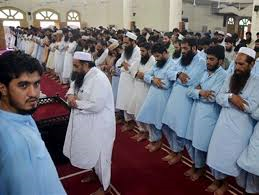
(Credit: commercialappeal.com)
A series of moves — which included strengthening ties with a militant faction that has al-Qaeda links — pointed to possible rifts within the Taliban and a potential major blow to hopes for negotiating an end Afghanistan’s 14-year conflict.
Yet the Taliban also offered some rare hints at outreach and self-reflection by apologizing for “mistakes” under the rule of the late Mohammad Omar, who Afghan officials said died more than two years ago.
A second round of peace talks between the Taliban and the government in Kabul had been scheduled to begin Friday in Pakistan, which hosted the opening session this month.
A statement from Pakistan’s foreign minister said the Taliban had requested the postponement amid “uncertainty” following confirmation of the death of Omar.
A spokesman for the Afghan government says it is investigating reports that Mullah Omar, the reclusive leader of the Afghan Taliban, may have died in 2013. (Reuters)
Taliban officials did not publicly announce their intention to snub the planned talks, but envoys at their political office in Qatar — the base for one major faction of the group — said earlier that they knew of no upcoming talks.
Seeking an end to the 14-year insurgency by Taliban forces is a major priority for Afghan President Ashraf Ghani. The Taliban leadership shifts put in motion by the formal announcement of Omar’s death, however, could raise new complications for the peace bid.
It also could deepen divisions between Taliban factions supporting the peace initiative and those seeking to press ahead with the insurgency, which has included stepped-up attacks in Kabul and gains by Taliban fighters in Afghanistan’s north.
In an e-mail to journalists, Taliban spokesman Zabiullah Mujahid said Omar had “abandoned this mortal world” as the result of an illness. It gave no further details, and the circumstances and location of Omar’s death remain murky.
On Wednesday, Afghan officials said Omar died in April 2013 in a hospital in the southern Pakistani city Karachi, but they left open speculation that the death carried what they called a “suspicious nature.”
It remains unclear how widely the knowledge of Omar’s death had spread among the Taliban’s ranks since April 2013. But the acknowledgment brought a quick response from the Taliban to proclaim its new leaders.
In comments to the Associated Press, Taliban officials said the group’s supreme council had met in Pakistan and picked Akhtar Mohammad Mansour, Omar’s longtime senior aide, to replace him. Mansour was widely considered a top candidate for the post, but his selection is likely to be controversial.
Although the Taliban said Omar had died of an illness, a rival militant faction accused Mansour and another aide of killing him. Also, Mansour is said to be close to Pakistan’s government. Leaders of several other factions — including those based in Qatar — distrust Pakistan’s powerful intelligence services.
Analysts and political leaders in Kabul said the tumult erupting within the Taliban could potentially empower hard-liners and derail the Afghanistan’s hopes for peace.
“The Taliban are much bigger troublemakers now than they were two years ago. They are more violent, more organized and causing more harm,” said Shukria Barakzai, a member of parliament who met with Taliban officials in Oslo several months ago as part of preparations for the talks.
Omar’s death, she said, “could encourage them even more in this direction. The peace process will take much longer now.”
In another leadership shift, the Taliban gave the No. 2 post to the head of the Haqqani network, a militant group that has connections to al-Qaeda. Sirajuddin Haqqani’s group is thought to be linked to a series of attacks, including an assault on the U.S. Embassy in Kabul in 2011.
Haqqani-linked fighters captured Army Sgt. Bowe Bergdahl in June 2009 when he disappeared from his base in eastern Afghanistan. Bergdahl was freed last year in a swap for a group of Guantanamo detainees.
“The Taliban are fighting very hard now, and the situation is getting more complicated than ever,” said Barakzai. “Only a powerful international presence can keep the talks going and keep the Taliban from veering in a very dangerous direction.”
The Taliban statement Thursday — issued in the name of Omar’s son and his brother, Abdul Manan — also apologized for “any mistakes” made by Omar during his “rule of Afghanistan.”
Omar was toppled by U.S. and allied forces after the Sept. 11, 2001, terrorists attacks on the United States for not surrendering al-Qaeda leader Osama bin Laden. During its six years in control, the Taliban imposed strict Islamic rule that included banning education for girls, and carrying out acts of cultural purging such as the destruction of ancient Buddha statues.
Murphy reported from Washington. Shaiq Hussain in Islamabad contributed to this report.
